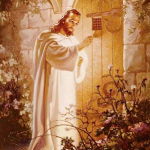Some called it "Touchdown Jesus," or "Big Butter Jesus," or "Quicksand Jesus," but the actual name for the giant statue outside of Solid Rock Church in Monroe, Ohio, was "King of Kings."
Whatever one calls it, that glorious piece of Roadside Americana is now gone. The statue was struck by lightning Monday night and burned to the ground.
 That's right, Jesus burned to the ground. Yet the Cowtown Cowboy still stands — along with hundreds of his kin. What does it all mean?
That's right, Jesus burned to the ground. Yet the Cowtown Cowboy still stands — along with hundreds of his kin. What does it all mean?
This is being interpreted by some in the congregation as a sign from God. Perhaps it was — perhaps Zeus was displeased that the people of Monroe, Ohio, had forsaken him. Lightning bolts, after all, are Zeus' thing, so if we're going to interpret them as signs of divine intervention, then Zeus is the divinity we should be talking about.
"This cannot be a coincidence," one member of the congregation said in that news report. She meant it had to be an act of God. Lightning destroyed the statue, but in her mind that means God used lightning to destroy the statue. When moth and rust doth corrupt and thieves break in and steal we seem content to lay the blame, appropriately, on moth and rust and thieves. But for some reason when lightning strikes, we assume God hurled that lightning, just like Zeus.
"This cannot be a coincidence."
Mark Brumley offers a fine response to that claim:
To be sure, the fire isn't a "coincidence" … when you build large fiberglass objects, you risk lightning striking them and burning them to the ground. That seems to be what happened here.
It might be expected by certain Christians that God would modify the laws of physics in the case of large fiberglass objects in the shape of Jesus, but apparently, in the divine wisdom, he has chosen to stick to the plan and have electricity work as electricity and fiberglass behave as fiberglass. …
Which is not to say that Providence has no other purpose here than to make the cosmos operate according to its natural physical laws, as if God's main purpose were to keep the trains running on time. But it is often difficult to say what Providence is up to and the temptation to try to reach a definitive judgment is frequently powerful, especially in cases such as this one, where imagination, unchecked by theological reflection and humility, assumes there must be a meaning larger than "Be careful what you build and what you build it out of."
















